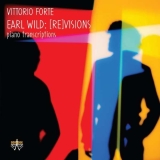 Earl Wild: Klaviertranskriptionen (Händel / Wild: Der harmonische Grobschmied-Variationen; Marcello / Wild: Adagio aus Oboenkonzert d-Moll; Rachmaninov / Wild: Lied-Transkriptionen op. 14 Nr. 8 & 11 + op. 21 Nr. 7, 8, 12; op. 34 Nr. 1; op. 38 Nr. 5; Tchaikovsky / Wild: Tanz der vier Schwäne aus Schwanensee + Auf dem Ball op. 38 Nr. 3: Gershwin / Wild: 7 Virtuose Etüden über Gershwin-Songs + Someone to watch over me-Improvisation (Thema mit 3 Variationen); CPE Bach / Forte: Solfeggietto; Vittorio Forte, Klavier; 1 CD Odradek ODRCD399; Aufnahmen 2020, Veröffentlichung 26/03/2021 (77'33) – Rezension von Remy Franck
Earl Wild: Klaviertranskriptionen (Händel / Wild: Der harmonische Grobschmied-Variationen; Marcello / Wild: Adagio aus Oboenkonzert d-Moll; Rachmaninov / Wild: Lied-Transkriptionen op. 14 Nr. 8 & 11 + op. 21 Nr. 7, 8, 12; op. 34 Nr. 1; op. 38 Nr. 5; Tchaikovsky / Wild: Tanz der vier Schwäne aus Schwanensee + Auf dem Ball op. 38 Nr. 3: Gershwin / Wild: 7 Virtuose Etüden über Gershwin-Songs + Someone to watch over me-Improvisation (Thema mit 3 Variationen); CPE Bach / Forte: Solfeggietto; Vittorio Forte, Klavier; 1 CD Odradek ODRCD399; Aufnahmen 2020, Veröffentlichung 26/03/2021 (77'33) – Rezension von Remy Franck
Es ist nicht das erste Mal, dass der italienische Pianist Vittorio Forte Transkriptionen des Amerikaners Earl Wild aufgenommen hat, diesmal ist daraus ein ganzes, 77 Minuten langes Programm geworden.
Earl Wild (1915-2010) scheute sich nicht, die hohe Technizität des modernen Flügels, sowie seine brillante und überschwängliche Seite zu nutzen. Er war in allen klassischen und romantischen Tricks bewandert und praktizierte den Hang zum Schönen und Angenehmen sowie zu Brillanz und er war einem gewissen Grad an Show nicht abhold, weshalb er bei vielen Musikfreunden und Kritikern in Ungnade fiel.
Vittorio Forte verteidigt seine Transkriptionen, die virtuosen wie auch die lyrischeren, ohne Skrupel mit viel Gestaltungsphantasie. Das ist kein verträumtes Quasi-Improvisieren, keine verspielte Salonmusik, sondern eine extrem klare, rein strukturierte Wiedergabe der 20 Stücke. Vittorio Forte hütet sich vor affektbesessener Betonungsinterpretation, vor Süße und Schmalz und begegnet diesen Transkriptionen mit jenem Grad an Musikalität, die sie mit pianistischem Raffinement interessant werden lässt.
It is not the first time that the Italian pianist Vittorio Forte has recorded transcriptions of the American Earl Wild, yet this time it has become a whole program, 77 minutes long.
Earl Wild (1915-2010) was not afraid to use the high technicality of the modern grand piano, as well as its brilliant and exuberant side. He was skilled in all the classical and romantic tricks and practiced a tendency to beauty, pleasantness, and brilliance, and he was even not averse to a certain degree of show, which is why he fell out of favor with many music lovers and critics.
Vittorio Forte defends his transcriptions, both the virtuoso and the more lyrical ones, without scruple, with a great deal of creative imagination. This is no dreamy quasi-improvisation, no playful salon music, but an extremely clear, purely structured performance of the 20 pieces. Vittorio Forte is wary of affect-obsessed emphasis interpretation, of sweetness and schmaltz, and meets these transcriptions with that degree of musicality which makes them interesting with pianistic refinement.
























